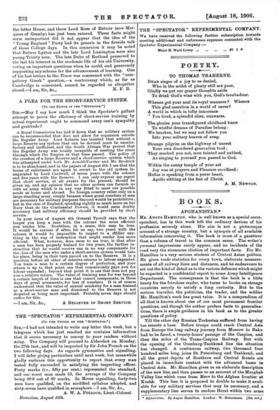A PLEA FOR THE SHORT-SERVICE SYSTEM. [To THY EDITOR OF
THE "SPECTATOR."]
SIR,—May I say how much I think the Spectator's gallant attempt to prove the efficiency of short-service training by actual experiment ought to command every one's sympathy and gratitude ?
A Royal Commission has laid it down that no military system can be recommended that does not allow for expansion outside the Regular Army. Lord Roberts has insisted that without a large Reserve any system that can be devised must be unsatis- factory and inefficient, and the South African War proved that the Regular Army was totally incapable of meeting the crisis through which the Empire at that time passed. The policy of the creation of a large Reserve and a short-service system which was attempted under both Mr. Arnold-Forster and Mr. Brodrick is to be abandoned, and in the papers of August 6th I see that the terms of enlistment are again to revert to the old system in- augurated by Lord Cardwell, of seven years with the colours and five years with the Reserve. I can only express my regret that short service, at all events for the present, should be given up, and my opinion that no other system can furnish us with an army which is in any way fitted to meet our possible needs at home and abroad. No foreign country relies only on a large standing army, simply because where great numbers of men are necessary for military purposes the cost would be prohibitive ; but in the case of England, spending rightly so much more on her Navy than do the Continental Powers, it would seem doubly necessary that military efficiency should be provided by short service.
In your issue of August 4th General Tyrrell says that the longer you keep a man with the colours the more efficient you render him. Doubtless, in a sense, this may be true. It would be curious if after, let us say, two years with the colours it would be impossible to impart to a soldier any- thing in the way of instruction that might render him more efficient. What, however, does seem to me true, is that after a man has been properly trained for two years, the further in- struction that he would receive can in no way compensate for the. loss of the men who under a short-service system would take his place, being in their turn passed on to the Reserve. It is a question before all other of relative returns to labour expended. You train a man to a certain degree of perfection, and your return is up to that point one that commercially pays you for labour expended ; beyond that point it is one that does not pay you a relative return. The value of training men for war beyond a certain length of time is one that cannot compensate, in these days of great armaments, for loss of numbers. It is of course understood that the value of annual musketry for a man trained• as a short-service man and dismissed to the Reserve is not disputed as being most important. Probably seven days should suffice for this.
am, Sir, &c., A BELIEVER IN SHORT SERVICE.


































 Previous page
Previous page